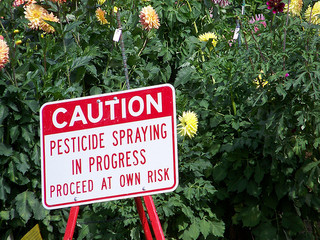How Do I Get Rid of Old Pesticides?
By Chris Williams on September 3, 2014.
 You just cleaned out your garage and discovered half a dozen containers of old garden pesticides that you didn’t even know were there. You know you shouldn’t just dump them in the trash. What do you do? There are three main sources of information regarding the disposal of old pesticide and pesticide containers.
You just cleaned out your garage and discovered half a dozen containers of old garden pesticides that you didn’t even know were there. You know you shouldn’t just dump them in the trash. What do you do? There are three main sources of information regarding the disposal of old pesticide and pesticide containers.
Three Places to Get the Information You Need
1. Label of the Pesticide
(Your first source of information is on the label of the pesticide that you want to get rid of. The pesticide label must have a section that tells you how to dispose of leftover pesticide and also how to handle the empty container. Look for a heading on the label like “Storage and Disposal.”
2. Environmental Protection Agency (EPA)
Your second source for disposal information is the Environmental Protection Agency (EPA). EPA has established federal guidelines for the safe disposal of pesticides and containers (see How to Dispose of Old Pesticides—Advice From EPA). However, just knowing EPA’s rules is not always good enough since some states (and even communities) have adopted their own guidelines that are stricter than the federal requirements or the requirements on the label.
3. State Agency on Pesticide Issues
To check your state’s regulations, contact your state lead agency on pesticide issues. This agency may be an office in the state’s Department of Agriculture, or a separate division of Pesticide Regulation, Environmental Conservation or something similar. For example, in Massachusetts, you would contact the Pesticide Bureau of the MA Department of Food and Agriculture. In New Hampshire, it’s the Division of Pesticide Control of the NH Department of Agriculture, Markets, & Food. These state offices work closely with the regional offices of the Environmental Protection Agency. If you can’t locate your state lead agency, check with your county Cooperative Extension Office.
- Generally, if the pesticide container still contains pesticide, you should try to use it up according to the directions on the label.
- If the container still contains some pesticide that you cannot safely use, it falls into the category of hazardous waste. Contact your local solid waste agency. To do so, look in the government section of your phone book under “solid waste,” “public works,” “refuse collection,” or similar. Many communities have a household hazardous waste collection program where you can dispose of chemicals like gasoline, antifreeze, and pesticides.
- If the pesticide container is empty, put it in the trash unless the pesticide label specifies a different disposal. Many guidelines require that you triple-rinse empty pesticide containers before you put them in the trash.
Photo credit: jetsandzeppelins / Foter / Creative Commons Attribution 2.0 Generic (CC BY 2.0)